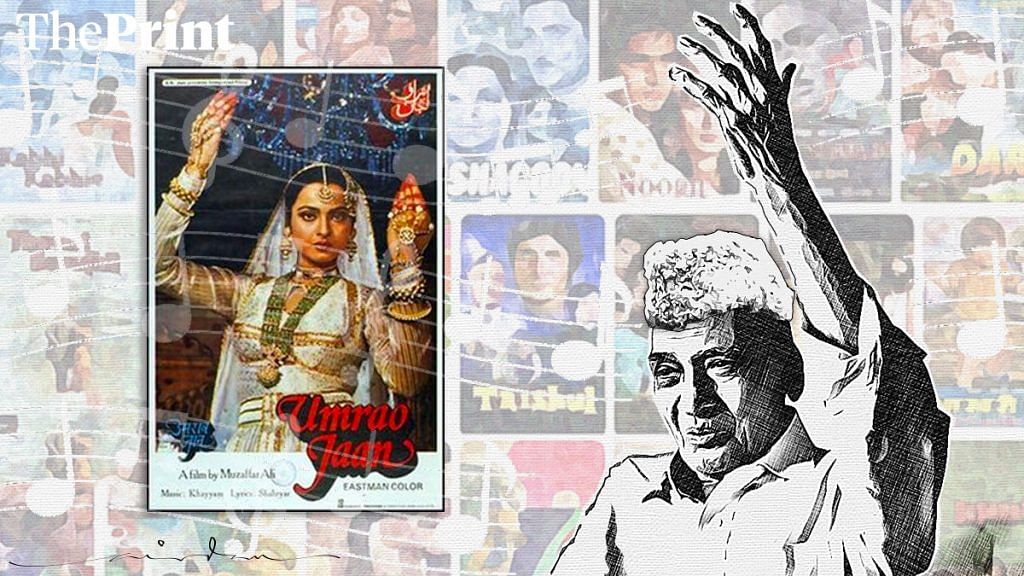New Delhi: Hindi cinema lost a legend this week with the passing away of music composer Mohammed Zahur Khayyam Hashmi, popularly known as Khayyam, at the age of 92.
He worked only on 40 films in his 70-year career — a rarity in Bollywood — but each of those was almost defined by its music. Be it Kabhi Kabhie, Umrao Jaan, Razia Sultan or Bazaar, the music of his films became a large part of their identity, and, in many cases, was even the reason they were hits.
But if there is one film of Khayyam’s that stands head and shoulders above the rest, one film he is synonymous with, it is the Umrao Jaan of 1981.
Starring a stunning Rekha in a career-defining performance, Umrao Jaan — based on the novel Umrao Jaan Ada by Mirza Hadi Ruswa — was directed, produced and co-written by Muzaffar Ali. The period drama tells the tale of Umrao, a courtesan in Lucknow during the 1800s.
Born Amiran, she is kidnapped from her parents’ home as a young girl and sold to a brothel run by Khanum Jaan, played by Shaukat Kaifi. She is groomed, given everything from jewellery and clothes to an education in the arts so that she can woo men. She takes an interest in shayari and builds a name for herself with her talent and beauty.
While she catches the eye of many men and even falls for a couple of them, tragedy seems to rear its ugly head throughout her life.
Umrao’s life is turned upside down when the British invade Lucknow and everyone is forced to flee. She returns to her hometown, Faizabad, where she reunites with her family, but finds that both the place and her relationships have changed irrevocably.
The movie is a must-watch for two reasons
First is the beautifully etched titular character, played to perfection by Rekha. Umrao is a strong female protagonist. She has seen injustice right from the moment she was kidnapped and sold off to the way the brothel madam treated her to how men treated her. Yet, she was resilient in creating and maintaining her own identity.
Umrao knew her strengths — beauty and intelligence — and used them to her advantage. The film is also a painfully sharp commentary on the irony of Indian patriarchy — in which women are equipped with the tools to dominate, but are conditioned in such a way that the tools actually render them powerless.
The second reason the film still has such a hold on audiences (a massive theatrical production was staged in Delhi just weeks ago) is its unforgettable music.
The film is about a courtesan who sings and dances, so music is obviously an integral part of it.
Khayyam, who won a National Award for this film, used music to not only give a sense of the political mood of the era when anti-British uprisings had just begun, but also to portray the interiority of Umrao’s character and desires.
Songs like Dil Cheez Kya Hai, In Aankhon Ki Masti Ke and Yeh Kya Jagah Hai Doston, sung brilliantly by Asha Bhosle, helped cement the character of Umrao and take her story forward — giving voice to her pain, her sensuality, her heartbreak.
Umrao grows into an adult in Raagmala, composes her first ghazal in Dil Cheez Kya Hai and falls in love to the tune of In Ankhon Ki Masti Ke.
Khayyam’s mastery over Hindustani classical music and his love for poetry shine throughout this film. He stuck to classical tones even in the 2000s when it was all about pop music.
This weekend, as we lose ourselves once more in tribute to the genius of Khayyam, these lines from one of his early poems come back to haunt us — “Hamari yaad aa jaati to hogi, achanak woh tadap jaate to honge”.
Also read: Remembering Sahir Ludhianvi, the rare ‘poet’ among Bollywood lyricists
